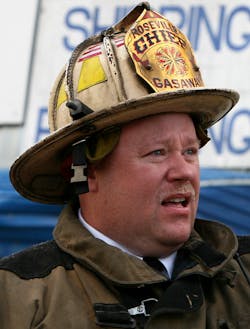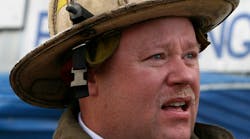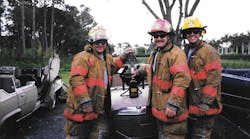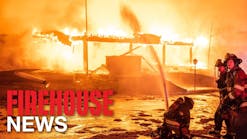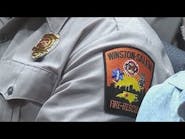In Part 1 of this topic, I focused on the immediate changes following retirement, including changes to your routine, how the fire department family changes and a personal purpose. In Part 2. I will pick up on the flaws found through situational awareness.
Flawed perception
Perception is a process by which we use our senses to gather information about what is happening in the environment around us. To do this, we must be paying attention, be mindful and be all-in. I wasn’t. I was focused heavily on my educational endeavors, which was completely understandable. Trying to balance a demanding full-time job with home life and the activities of four kids while dedicating 20-plus hours a week to school created many competing demands for my attention.
While I knew that once I completed my education I would be making my climb down the ladder, I had not paid much attention to things that were happening both in my organization and in my personal life. I missed some important clues and cues that would have certainly helped me understand more of what I needed to do and not do.
Flawed understanding
As with emergency scene situational awareness, when the perception is flawed there is a high probability that understanding will also be impacted. This was certainly the case for me. I knew I was going to leave my job but I didn’t have a definite plan about how to do that. So when the time came, the decision to climb down, compounded by some conflicts I was experiencing with my then-new boss, came sooner than I had expected.
As time passed, it became more and more evident to me that my boss’s management style and my leadership style were incompatible. It was evident we were at an impasse and something needed to happen. I agreed that I would depart and was allowed to continue my employment for 90 days, allowing me to retire on the date of my 30th anniversary in the fire service.
While I did not care for his management style, I was grateful that he agreed to those terms. I was eager to leave and start a new chapter of my career. But, nonetheless, I was not departing on the terms of the plan I had laid out for myself. Thus, my climb down the ladder more resembled an unexpected fall.
Flawed prediction
In the situational awareness development continuum, the ability to accurately predict future events may be one of the most important skills a responder can possess. Ironically, it is also one of the most important skills one can possess when preparing for the climb down the ladder.
My future predictions were all focused on my next career—what I would be doing, where I would be working, what contributions I would be making—all tied to teaching at a college or university.
Because my climb/fall occurred faster than I expected, I was way underprepared. I would liken it to operating on the roof of a structure and suddenly and without warning there is a collapse and you find yourself in a bad place—a place you don’t want to be in—and full of anger and confusion about how it happened.
I had not given enough thought to how I would orchestrate my departure. How would I make the announcement? How would I do this gracefully and without having an emotional meltdown? Like many, my entire adult life had been spent in a uniform, serving others. That was about to come to an abrupt ending.
Frustration
It has been seven years since my climb/fall down the ladder and I have had very little time to look back and very little regret. I count myself among the fortunate ones who rebounded very quickly. I attribute this to the planning that I had done, albeit incomplete planning.
At the initial onset of my climb/fall, I was quite bitter and angry. Looking back, I attribute this to the fact that I wasn’t leaving completely on my terms and on my timeline. Interestingly, I was ready to go—very ready. I wanted to get on with the next chapter in my life and career. I had a passion burning inside me for sharing the situational awareness and high-risk decision-making message that was so strong that I often could not sleep at night. So the fact that I was now unemployed was not the issue. It was how it happened and my lack of control over the ending of a 30-year career.
Surprises
I am not a person who is easily surprised. In fact, I don’t like surprises. I was that kid who would snoop through the closets at Christmastime to see what my parents had bought me and then I would act surprised on Christmas morning even though I had already figured out just about everything I was getting.
There were two things that surprised me when I left. First, there was the lack of appreciation from my city’s elected officials for the dedication I had given over the previous 10 years. Like many fire chiefs in smaller communities, I was a very active responder and was active in drills and meetings on the local and regional level.
Workweeks were often 60-70 hours. During my 10-year term the organization went through a metamorphosis of change and, of course, that is very time- and energy-consuming. I can say, without a doubt, the department was left in much better shape when I departed than when I started. I will take very little credit for this, as it was the efforts of many dedicated members with an extreme passion for excellence. But, I will acknowledge that I was there along the way and dedicated very long hours to the process of facilitating the changes.
I was also surprised with how few people from the fire department made any effort to wish me well on my new endeavors. I’m sure some were very happy to see me go. I suppose some were disappointed and maybe even angry with me for leaving. And I am confident there were some who were completely indifferent and could care less who the chief is. I guess I expected more.
What did more mean? I’m not sure. A retirement dinner? An invitation to the next appreciation banquet and a plaque? An invite to have lunch on occasion with a crew? Something. But, in the end, none of that happened. I’m not bitter. Just disappointed that I now realize that all that hard work really meant so little to the people I cared so much about for so long. I guess I expected more.
Financial implications
When I left, I did not draw a pension because I had only spent 10 years in the system. Also, I had not reached mandatory minimum age to draw my pension. So I found myself scrambling, unexpectedly, for an income. The bills did not stop coming simply because I was no longer employed. Adding to the financial strain, my student loan repayment kicked in as well. The monthly student loan payment was more than my house payment. No pressure, right?
However, when it came to the financial component of the climb down the ladder, I had a solid plan. I had been a public speaker for the better part of 20 years and I had refined my message and my stagecraft in such a way that it was a relatively smooth transition for me and financial concerns were quickly allayed. But all was not rosy.
The dark side
There was a dark side to this climb down. I was not able to perceive, understand or predict the massive feeling of loss I would encounter. I think this feeling of loss of identity, loss of routine, loss of purpose, loss of status and stature, and loss of respect is something that most first responders who climb down the ladder feel—though they may not admit it or want to talk about it.
I didn’t talk about it. I didn’t share my feelings with anyone. It was literally like going through the grieving process after the loss of a loved one. Something I loved deeply and had loved for so long was now gone. Lock, stock and barrel, out of my life forever. Granted, for some it isn’t forever. They take another job in public safety and start their second career doing the same thing they had done previously.
However, oftentimes that second career just doesn’t live up to the first. The people are different. The routines are different. The culture is different. The policies, procedures and operating practices are different. In a word, it’s different. And some struggle with this difference.
For me, finding my new passion as a professional speaker, writer, podcaster and author was very fulfilling. But, it was different. I wasn’t in charge of anything. I didn’t have anyone to mentor. No one was coming to me with problems to be solved or seeking my advice about how to be better at their job. There were no lunches at the fire station. No invites for social activities. No community events to be part of. That was gone from my life and it left a hole—a hole larger than I could have imagined.
Rediscovery
I had to rediscover my passion. I realized quickly that I needed to adjust my thinking and get my mind, body and spirit behind something that was going to give me drive—something that would make me so excited that I would pop out of bed again. Fortunately, that was public speaking and, more specifically, helping first responders understand how to develop and maintain situational awareness and how to improve high-risk decision-making.
The more I spoke, the more I felt fulfilled. At one time I would have thought the greatest compliment that could be paid to me was for a citizen to say “You saved my life. Thank you.” I was wrong. The greatest compliment (for me) is when a first responder says to me: “Something you taught me in class saved my life. Thank you.” Nothing will ever top the feeling I get from knowing that my message truly, truly saves lives.
Advice
Thank you for enduring this journey with me. I hope it was easier for you to read than it was for me to write. Many emotions came flooding back into my mind as I had to read the words I was typing on the screen. I would like to close by offering you my best hindsight advice for how to climb down with grace.
- Make a plan: It can happen at any time, either expectedly or unexpectedly. A plan will help you prepare mentally because you will have thought about the challenges you will face.
- Talk to your family: Call a family meeting and have a discussion around the impact it might have on their lives if you were no longer a public safety provider. The younger your family, the more important this discussion will be.
- Talk to others who have climbed down the ladder: I didn’t do this and I regret that I didn’t. Since my climb down I have talked to hundreds of responders about their climbs down and how it impacted them. Some have offered great advice for how they coped with the loss. Some are still struggling many years after they climbed down.
- Consider professional counseling: I didn’t do this either but I can see the benefit of it. I recently talked with a firefighter whose father committed suicide shortly after he retired. This firefighter shared with me that his father struggled with the loss of identity and it was a contributing factor to his death. Looking back I would say I experienced a bout of depression as a result of my loss and I consider myself fortunate that I was able to pull myself out of it with relative ease. I don’t know that everyone can be as lucky as I was. In fact, in my situational awareness programs I am very critical of those who rely on luck.
- Find your passion well before you leave: This is one of the things I feel very fortunate about. I was so ramped up to share the situational awareness message that I could hardly wait to get started. I was hanging on to my job white-knuckled waiting for the right time to leave. I wanted to share the message more than I wanted to be a fire chief. That ended up be a blessing for me because I transitioned to a new position that quickly replaced the passion of being a fire chief. Develop your passion for your next chapter in life two to five years before your departure. On the risk that your climb down will be a fall, have a fallback (Plan B) option. Make sure it’s something that will drive you.
- Get networked: Unfortunately, this is also something I did not do. I didn’t know anyone who had been through what I had been through. I didn’t have anyone I could talk to who I thought would understand my feelings because they had been there and done that. My fire service mentors were all still active duty, so I knew with confidence they would have no connection to the feeling of loss associated with my climb/fall down the ladder. I think it would have been handy to be connected with like-minded individuals who I could commiserate with and who could give me coaching and encouragement about how to work through this.
- Have friends outside the department: This is another thing that I struggled with and, quite frankly, still struggle with. Because most of those people I thought were friends ended up being work acquaintances and not true friends, that network of people dried up quickly. The loss of that group of people in my life is tough. When, suddenly, there is no one to help you move something or no one to play golf with, or no one to invite over to the house to sit around the campfire. It stings. Get some non-fire service friends. Not only will it broaden your horizons, it will also help you when those “friends”—who weren’t really friends anyhow—are gone from your life.
Whether it's a climb down or a fall down, we are all coming down that success ladder. Like it or not, it will happen to you. Even if your “plan” is to die while still working, you’re still coming down that ladder—one way or another. I make this last morbid comment because of the number of responders I have talked to about their plans to climb down and they tell me their plan is to die on the job.
I’m serious. I can’t make this stuff up. They are so afraid of climbing down that they want to die while still on the ladder. Some are so alienated from their families because of their years of dedication to the department that they feel it is too late to mend the relationships they have severed. It’s not.
All you need to do is offer a humble apology for missing so much of their lives while they were growing up and offer to be part of their lives now, but in a limited way. Don’t expect that simply because you’ve climbed down the ladder and now have lots of time on your hands that your kids or grandkids will have a new found interest in you being around all the time. Around some of the time, sure. Around daily, no. Respect the boundaries and their need to be independent of you.
I’ve started a private Facebook page for anyone who would like to be connected with a like-minded group of public safety responders. This will be a good place to get connected with others who:
- Are anticipating their climb down the ladder
- Are in the process of climbing down the ladder
- Have climbed down and would like to be connected with others who have
- Fell down the ladder
- Were thrown off the ladder and abandoned
Please let me know how I can help you prepare and to find your afterlife passion.
RICHARD B. GASAWAY, Ph.D., served 30 years in public safety, including 22 years as a chief fire officer, before retiring in 2009. He holds bachelor’s, master’s and a doctor of philosophy degrees in finance, economics, business administration and leadership and is the principal consultant at the Gasaway Consulting Group. He runs the Situational Awareness Matters! website www.SAMatters.com.
